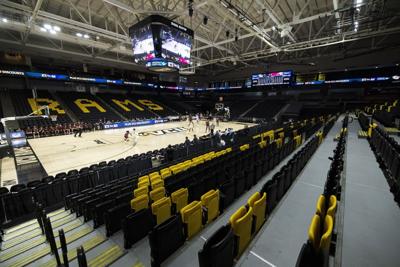RICHMOND — Virginia Commonwealth University will start renting out the Siegel Center for concerts and events in an effort to generate revenue for athletes.Â
VCU has partnered with  to manage the facility. The university expects to spend $5 million compensating its athletes beginning next year. For the first time, colleges will be able to directly and legally pay their players, pending final approval of a lawsuit against the NCAA.Â
The addition of the Siegel Center gives Greater Richmond yet another concert venue. VCU's basketball arena is larger than most other destinations and indoors.Â
Under the agreement, ASM Global will oversee the operation of special events at the Siegel Center beginning July 1, and the first events could begin this fall.Â
People are also reading…
ASM Global manages more than 400 stadiums, arenas, theaters and convention centers, including Altria Theater, Dominion Energy Center, the Henrico Sports & Events Center and the University of Virginia's John Paul Jones Arena. It was also a partner in the failed GreenCity Arena project in Henrico County.
ASM will manage the acts coming through and install a rigging grid system to mount lights and speakers. Then VCU will receive a cut of the revenue. The university believes it can host up to 30 events a year between concerts, family shows and private events, generating at least $650,000 a year for the athletics department. Â
The 200,000-square-foot Siegel Center holds about 7,600 people for basketball games and will have a capacity of about 5,500 for concerts, which typically block one end.Â
Bringing in outside events is one of many strategies VCU is using to raise $5 million annually to pay its players. Finding the necessary revenue has been a "jigsaw puzzle," said Ed McLaughlin, VCU's athletics director. VCU has raised money from fundraising, corporate partnerships, ticket sales and concessions. It is also working to cut unnecessary costs.Â
"There's no one source where the revenue is coming from," McLaughlin said. "We had one of our best sales years ever this year."Â
VCU has raised the $5 million it needs for the coming school year and is working to raise funds for future years. As employees have asked donors for gifts, they have learned that while some donors really believe in paying college athletes – others don't believe in it at all, McLaughlin said.Â
In the immediate future, VCU will not charge season ticket holders a license for their seats. Earlier this year, the University of Virginia said it would eventually require donations – some exceeding $100,000 – to guarantee a season ticket holder will keep his or her seats.
VCU also will not increase the fee students pay toward athletics to cover the cost of revenue sharing, McLaughlin added. Altogether, the VCU athletics department will increase its budget from about $45 million annually to $50 million.Â
The university has not determined how much it will pay its men's basketball team, the athletics director said. Men's hoops players, who drive by far the most revenue in the department, are expected to reap the lion's share.Â

VCU and Fordham played a basketball game in an empty Siegel Center in January during the city’s water crisis.
The Siegel Center gives greater Richmond yet another destination on its list of concert venues. In addition to the local spots ASM Global manages, places to see a concert include: The National, Brown's Island, Maymont, Lewis Ginter Botanical Garden, Innsbrook Pavilion, Virginia Credit Union Live, Atlantic Union Bank After Hours in Doswell and the former Washington football training camp facility.Â
On June 6, the Allianz Amphitheater at Riverfront opens with Kansas and 38 Special, adding yet another home for music. And in 2026, when the Flying Squirrels baseball stadium, CarMax Park, debuts, it will have an event space for about 700 people called the Atlantic Union Bank Lounge.Â
But the Siegel Center "fills a niche" in the local market because of its location, seating capacity and production capabilities, said Harry Cann, a senior vice president for ASM.
The Siegel Center, named for Stuart C. Siegel, a primary donor, opened in 1999 and hosted musical acts for a period of time.Â
















